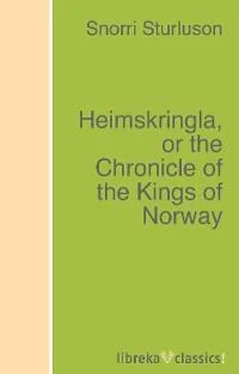Snorri Sturluson - Heimskringla, or the Chronicle of the Kings of Norway
Здесь есть возможность читать онлайн «Snorri Sturluson - Heimskringla, or the Chronicle of the Kings of Norway» — ознакомительный отрывок электронной книги совершенно бесплатно, а после прочтения отрывка купить полную версию. В некоторых случаях можно слушать аудио, скачать через торрент в формате fb2 и присутствует краткое содержание. Жанр: unrecognised, на английском языке. Описание произведения, (предисловие) а так же отзывы посетителей доступны на портале библиотеки ЛибКат.
- Название:Heimskringla, or the Chronicle of the Kings of Norway
- Автор:
- Жанр:
- Год:неизвестен
- ISBN:нет данных
- Рейтинг книги:3 / 5. Голосов: 1
-
Избранное:Добавить в избранное
- Отзывы:
-
Ваша оценка:
- 60
- 1
- 2
- 3
- 4
- 5
Heimskringla, or the Chronicle of the Kings of Norway: краткое содержание, описание и аннотация
Предлагаем к чтению аннотацию, описание, краткое содержание или предисловие (зависит от того, что написал сам автор книги «Heimskringla, or the Chronicle of the Kings of Norway»). Если вы не нашли необходимую информацию о книге — напишите в комментариях, мы постараемся отыскать её.
libreka classics – These are classics of literary history, reissued and made available to a wide audience.
Immerse yourself in well-known and popular titles!
Heimskringla, or the Chronicle of the Kings of Norway — читать онлайн ознакомительный отрывок
Ниже представлен текст книги, разбитый по страницам. Система сохранения места последней прочитанной страницы, позволяет с удобством читать онлайн бесплатно книгу «Heimskringla, or the Chronicle of the Kings of Norway», без необходимости каждый раз заново искать на чём Вы остановились. Поставьте закладку, и сможете в любой момент перейти на страницу, на которой закончили чтение.
Интервал:
Закладка:
Afterwards the Gautlanders came down to the strand with a great army, and gave battle to King Harald, and great was the fall of men. But it was King Harald who gained the day. Thus says Hornklofe:—
18. HRANE GAUZKE'S DEATH.
King Harald went far and wide through Gautland, and many were the battles he fought there on both sides of the river, and in general he was victorious. In one of these battles fell Hrane Gauzke; and then the king took his whole land north of the river and west of the Veneren, and also Vermaland. And after he turned back there-from, he set Duke Guthorm as chief to defend the country, and left a great force with him. King Harald himself went first to the Uplands, where he remained a while, and then proceeded northwards over the Dovrefjeld to Throndhjem, where he dwelt for a long time. Harald began to have children. By Asa he had four sons. The eldest was Guthorm. Halfdan the Black and Halfdan the White were twins. Sigfrod was the fourth. They were all brought up in Throndhjem with all honour.
19. BATTLE IN HAFERSFJORD.
News came in from the south land that the people of Hordaland and Rogaland, Agder and Thelemark, were gathering, and bringing together ships and weapons, and a great body of men. The leaders of this were Eirik king of Hordaland; Sulke king of Rogaland, and his brother Earl Sote: Kjotve the Rich, king of Agder, and his son Thor Haklang; and from Thelemark two brothers, Hroald Hryg and Had the Hard. Now when Harald got certain news of this, he assembled his forces, set his ships on the water, made himself ready with his men, and set out southwards along the coast, gathering many people from every district. King Eirik heard of this when he same south of Stad; and having assembled all the men he could expect, he proceeded southwards to meet the force which he knew was coming to his help from the east. The whole met together north of Jadar, and went into Hafersfjord, where King Harald was waiting with his forces. A great battle began, which was both hard and long; but at last King Harald gained the day. There King Eirik fell, and King Sulke, with his brother Earl Sote. Thor Haklang, who was a great berserk, had laid his ship against King Harald's, and there was above all measure a desperate attack, until Thor Haklang fell, and his whole ship was cleared of men. Then King Kjotve fled to a little isle outside, on which there was a good place of strength. Thereafter all his men fled, some to their ships, some up to the land; and the latter ran southwards over the country of Jadar. So says Hornklofe, viz.:—
20. HARALD SUPREME SOVEREIGN IN NORWAY.
After this battle King Harald met no opposition in Norway, for all his opponents and greatest enemies were cut off. But some, and they were a great multitude, fled out of the country, and thereby great districts were peopled. Jemtaland and Helsingjaland were peopled then, although some Norwegians had already set up their habitation there. In the discontent that King Harald seized on the lands of Norway, the out-countries of Iceland and the Farey Isles were discovered and peopled. The Northmen had also a great resort to Hjaltland (Shetland Isles) and many men left Norway, flying the country on account of King Harald, and went on viking cruises into the West sea. In winter they were in the Orkney Islands and Hebrides; but marauded in summer in Norway, and did great damage. Many, however, were the mighty men who took service under King Harald, and became his men, and dwelt in the land with him.
21. HARALD'S MARRIAGE AND HIS CHILDREN.
When King Harald had now become sole king over all Norway, he remembered what that proud girl had said to him; so he sent men to her, and had her brought to him, and took her to his bed. And these were their children: Alof—she was the eldest; then was their son Hrorek; then Sigtryg, Frode, and Thorgils. King Harald had many wives and many children. Among them he had one wife, who was called Ragnhild the Mighty, a daughter of King Eirik, from Jutland; and by her he had a son, Eirik Blood-axe. He was also married to Svanhild, a daughter of Earl Eystein; and their sons were Olaf Geirstadaalf, Bjorn and Ragnar Rykkil. Lastly, King Harald married Ashild, a daughter of Hring Dagson, up in Ringerike; and their children were, Dag, Hring, Gudrod Skiria, and Ingigerd. It is told that King Harald put away nine wives when he married Ragnhild the Mighty. So says Hornklofe:—
King Harald's children were all fostered and brought up by their relations on the mother's side. Guthorm the Duke had poured water over King Harald's eldest son and had given him his own name. He set the child upon his knee, and was his foster-father, and took him with himself eastward to Viken, and there he was brought up in the house of Guthorm. Guthorm ruled the whole land in Viken and the Uplands, when King Harald was absent.
22. KING HARALD'S VOYAGE TO THE WEST.
King Harald heard that the vikings, who were in the West sea in winter, plundered far and wide in the middle part of Norway; and therefore every summer he made an expedition to search the isles and out-skerries (1) on the coast. Wheresoever the vikings heard of him they all took to flight, and most of them out into the open ocean. At last the king grew weary of this work, and therefore one summer he sailed with his fleet right out into the West sea. First he came to Hjaltland (Shetland), and he slew all the vikings who could not save themselves by flight. Then King Harald sailed southwards, to the Orkney Islands, and cleared them all of vikings. Thereafter he proceeded to the Sudreys (Hebrides), plundered there, and slew many vikings who formerly had had men-at-arms under them. Many a battle was fought, and King Harald was always victorious. He then plundered far and wide in Scotland itself, and had a battle there. When he was come westward as far as the Isle of Man, the report of his exploits on the land had gone before him; for all the inhabitants had fled over to Scotland, and the island was left entirely bare both of people and goods, so that King Harald and his men made no booty when they landed. So says Hornklofe:—
In this war fell Ivar, a son of Ragnvald, Earl of More; and King Harald gave Ragnvald, as a compensation for the loss, the Orkney and Shetland isles, when he sailed from the West; but Ragnvald immediately gave both these countries to his brother Sigurd, who remained behind them; and King Harald, before sailing eastward, gave Sigurd the earldom of them. Thorstein the Red, a son of Olaf the White and of Aud the Wealthy, entered into partnership with him; and after plundering in Scotland, they subdued Caithness and Sutherland, as far as Ekkjalsbakke. Earl Sigurd killed Melbridge Tooth, a Scotch earl, and hung his head to his stirrup-leather; but the calf of his leg were scratched by the teeth, which were sticking out from the head, and the wound caused inflammation in his leg, of which the earl died, and he was laid in a mound at Ekkjalsbakke. His son Guthorm ruled over these countries for about a year thereafter, and died without children. Many vikings, both Danes and Northmen, set themselves down then in those countries.
23. HARALD HAS HIS HAIR CLIPPED.
After King Harald had subdued the whole land, he was one day at a feast in More, given by Earl Ragnvald. Then King Harald went into a bath, and had his hair dressed. Earl Ragnvald now cut his hair, which had been uncut and uncombed for ten years; and therefore the king had been called Lufa (i.e., with rough matted hair). But then Earl Ragnvald gave him the distinguishing name—Harald Harfager (i.e., fair hair); and all who saw him agreed that there was the greatest truth in the surname, for he had the most beautiful and abundant head of hair.
Читать дальшеИнтервал:
Закладка:
Похожие книги на «Heimskringla, or the Chronicle of the Kings of Norway»
Представляем Вашему вниманию похожие книги на «Heimskringla, or the Chronicle of the Kings of Norway» списком для выбора. Мы отобрали схожую по названию и смыслу литературу в надежде предоставить читателям больше вариантов отыскать новые, интересные, ещё непрочитанные произведения.
Обсуждение, отзывы о книге «Heimskringla, or the Chronicle of the Kings of Norway» и просто собственные мнения читателей. Оставьте ваши комментарии, напишите, что Вы думаете о произведении, его смысле или главных героях. Укажите что конкретно понравилось, а что нет, и почему Вы так считаете.












